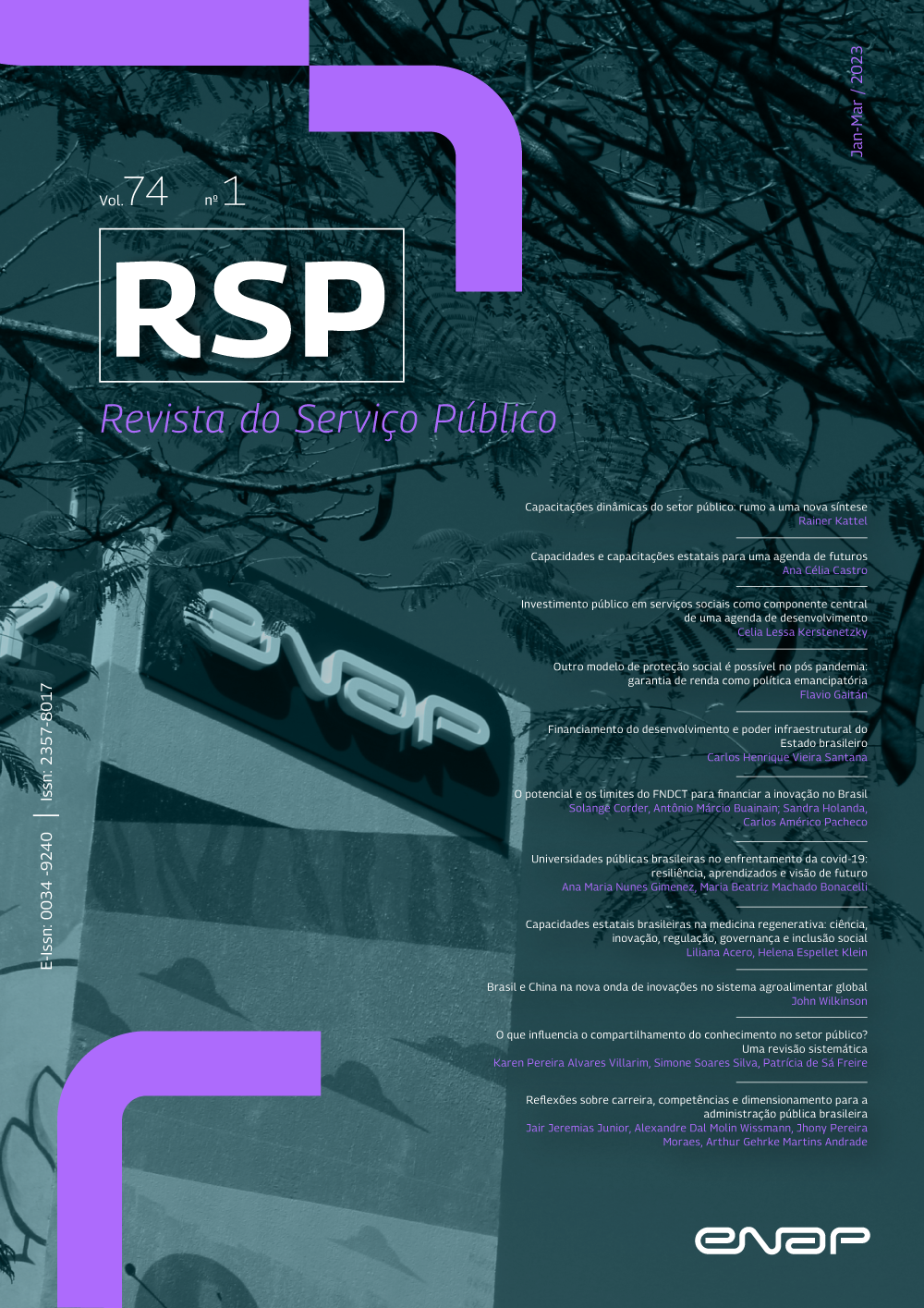La inversión pública en servicios sociales como componente central de una agenda de desarrollo
Palabras clave:
proyecto de desarrollo, gasto público, servicios sociales públicos, necesidades sociales, sostenibilidadResumen
En este artículo presento la propuesta de elevar los servicios sociales públicos al estatus de componente
central de un proyecto de desarrollo. ¿Por qué servicios sociales públicos? Además de las evidentes y
urgentes necesidades sociales, ¿qué justificaciones teóricas reclaman para la atención pública? ¿Qué
tan actuales son estas justificaciones en términos de debates contemporáneos? ¿Qué efectos indirectos
desencadenan los servicios sociales públicos y qué evidencia tenemos de los resultados deseables en
términos de los desafíos de desarrollo contemporáneos? Estas son las preguntas que me preocupan aquí.
Descargas
Citas
ALVARENGA JUNIOR, M. Efeitos de encadeamento ambiental dos setores econômicos no Brasil. Manuscrito. Rio de Janeiro: UFRJ, 2021.
ARROW, K. J. Uncertainty and the Welfare Economics of Medical Care. The American Economic Review, v. 53, n. 5, p. 941-973, 1963
ATKINSON, A. Inequality: what can be done? Cambridge: Harvard University Press, 2015
AUTOR, D. 2021, The work of the future: where it will come from? https://www.lse.ac.uk/Events/2021/05/202105051800/work. Accessed on 5 May 2021
BARBOSA, A. L. N. H.; COSTA, J. Oferta de creche e participação das mulheres no mercado de trabalho no Brasil. Mercado de Trabalho – Conjuntura e Análise, ano 23, n. 62, p 23-35, 2017.
BARR, N. Economic Theory and the Welfare State: A Survey and Interpretation. Journal of Economic Literature, v. 30, n. 2, p. 741–803, 1992
BARROS, R. P. et al. The impact of access to free childcare on women’s labor market outcomes: evidence from a randomized trial in low-income neighborhoods of Rio de Janeiro. Prepared for the 2011 World Bank Economists’ Forum. Washington: World Bank, 2011
BAUMOL, W. J.; BOWEN, W. G. Performing Arts, The Economic Dilemma: a study of problems common to theater, opera, music, and dance. Cambridge: M.I.T. Press. 1966
BHALOTRA, S; ROCHA, RUDI e SOARES, R.R. Does Universalization of
Healthwork? Evidence from Health Systems. Restructuring and Expansion in Brazil,
Discussion Papers, No. 12111, Institute for the Study of Labor (IZA), Bonn. January, 2019.
BEVERIDGE, W. Social insurance and allied services. London: HMSO, 1942
BOYER, R. Democracy and Social Democracy Facing Contemporary Capitalisms: A ‘Régulationist’ Approach. Working Paper 2008-36, Paris, Paris-Jourdan Sciences Economiques, Laboratoire D’Economie Appliquée, 2008
BRUCE, R.; FIRPO, S.; FRANÇA, M.; MELONI, L., Racial Inequality in Health Care During a Pandemic. 2020. Available at SSRN: https://ssrn.com/abstract=3691313 or http://dx.doi.org/10.2139/ssrn.3691313
BRYNER, N. The Green New Deal and Green Transitions. Vermont Law Review 44 (4): 723-776, 2020
CARVALHO, F. J. C.. Keynes And The Reform Of The Capitalist Social Order. Journal of Post Keynesian Economics, Vol. 31, no 2, 191-211, 2009
COOTE, A. Universal basic services and sustainable consumption. Sustainability: Science, Practice and Policy, v. 17, n. 1, p. 32–46, 2021.
COOTE, A.; PERCY, A. The Case for Universal Basic Services. Hoboken: John Wiley & Sons, 2020.
CORAK, M. Income Inequality, Equality of Opportunity, and Intergenerational Mobility. Journal of Economic Perspectives, v. 27, n. 3, p. 79–102, 2013.
CUNHA, F.; HECKMAN, J. The Technology of Skill Formation. American Economic Review, vol. 97, n. 2, p. 31-47, 2007
DI GIULIO; DEFILA, R. The ‘good life’ and protected needs. In: Routledge Handbook of Global Sustainability Governance. Londres: Routledge, 2019.
DUQUE, V. A. D. Intergenerational Income and Educational Mobility An analysis between the 1970's and the 2010's in Brazil. Dissertação de Mestrado PPGE-UFRJ, (adicionar número de páginas) 2019
DURKHEIM, E. [1893]. The Division of Labor in Society, The Free Press of Glencoe, Illinois, 1960.
DWECK, E. Por que é imprescindível revogar o teto de gastos?, em: P. L. ROSSI; E. DWECK; A. L. M. OLIVEIRA, Economia Pós Pandemia: Desmontando os mitos da austeridade fiscal e construindo um novo paradigma econômico no Brasil. São Paulo: Autonomia Literária, 2020
ESPING-ANDERSEN, G. Families in the 21st Century. Stockholm: SNS Förlag, 2016
ESPING-ANDERSEN, G. The Incomplete Revolution: Adapting to Women’s New Roles. Cambridge: Polity Press, 2009
ESPING-ANDERSEN, G. The Three Worlds of Welfare Capitalism. Princeton: Princeton University Press, 1990.
ESPING-ANDERSEN, G.; MYLES, J.; GALLIE, D.; HEMERIJCK, A. Why we need a new welfare state. Oxford: Oxford University Press, 2002
EVANS, P. Constructing the 21st century Developmental State: Potentialities and Pitfall. Mimeo: UC-Berkeley, 2009
FERREIRA, F. H. . Inequality and economic performance: a brief overview of theories of growth and distribution. Washington: World Bank, 1999
FOCHESATO, M.; BOWLES, S. Nordic exceptionalism? Social democratic egalitarianism in a world-historic perspective. Journal of Public Economics. v. 127, p. 30–44, 2015.
FUJIWARA, T. Voting Technology, Political Responsiveness, and Infant Health: Evidence From Brazil. Econometrica, v. 83, n. 2, p. 423–464, 2015.
GONÇALVES, S. The Effects of Participatory Budgeting on Municipal Expenditures and Infant Mortality in Brazil. World Development, v. 53, p. 94–110, 2014.
HIRVILAMMI, T. The Virtuous Circle of Sustainable Welfare as a Transformative Policy Idea. Sustainability, v. 12, n. 1, pp. 391-406, 2020.
HOJMAN, A.; BOO, F. L. Cost-Effective Public Daycare in a Low-Income Economy Benefits Children and Mothers. Washington: IDB, 2019. (Working Paper Series Nº 1036)
HOWITT, P.; AGHION, P. Capital Accumulation and Innovation as Complementary Factors in Long-Run Growth. Journal of Economic Growth, v. 3, n. 2, p. 111–130, 1998.
HOWITT, P.; AGHION, P. Capital accumulation and innovation as complementary factors in long-run growth. Journal of Economic Growth, vol. 3, n. 1, p. 111-130, 1998
IPEA. Gastos com a Política Social: alavanca para o 320 crescimento com distribuição de renda. Comunicado n. 75. Brasília: IPEA, 2011
IPEA. Os efeitos econômicos do gasto social no Brasil. In: Perspectivas da Política Social. Brasília: IPEA, 2010.
IVERSEN, T.; WREN, A. Equality, Employment, and Budgetary Restraint: The Trilemma of the Service Economy. World Politics, v. 50, n. 4, p. 507–546, jul. 1998.
JUDT, T. Um tratado sobre os nossos actuais descontentamentos. 1. Ed., Lisboa: Leya, Brasil, 2016
KANGAS, O.; PALME, J. (eds), Social Policy and Economic Development in the Nordic Countries. New York: Palgrave Macmilla , 2005
KAPP, K. W. The Heterodox Theory of Social Costs. Ed. Sebastian Berger. Londres: Routledge, 2017
KERSTENETZKY, C. L. Consumo social e crescimento redistributivo: Notas para se pensar um modelo de crescimento para o Brasil. Brazilian Journal of Political Economy, v. 36, p. 29–45, 2016.
KERSTENETZKY, C. L. O Estado do Bem-Estar Social na idade da razão. Rio de Janeiro: Elsevier, 2012
KERSTENETZKY, C. L.; MACHADO, D. C., Labor Market Developments in Brazil: formalization at last? In: Werner Baer, Edmund Ammann & Carlos Alberto Azzoni, The Oxford Handbook of the Brazilian Economy, Oxford University Press, 2018
KERSTENETZKY, C.L.; PERO, V.; GUEDES, G.; BAHIA, L. Desenvolvimento baseado em infraestrutura social. Projeto de Pesquisa CEDE-UFRJ. Rio de Janeiro, 2021.
LUSTIG, N. The redistributive impact of government spending on education and health: evidence from thirteen developing countries in the Commitment to Equity Project. In: CLEMENTS, Benedict; DE MOOIJ, Ruud; GUPTA, Sanjeev; KEEN, Michael (eds.). Inequality and fiscal policy. Washington: IMF, 2015.
MACINKO, J; MENDONÇA, C. S. Estratégia Saúde da Família, um forte modelo de Atenção Primária à Saúde que traz resultados. Saúde debate, Rio de Janeiro, v. 42, n.
spe1, p. 18-37. 2018.
MARCUZZO, M. C. Keynes and the Welfare State. Dipartimento di Scienze Economiche, Università di Roma, “La Sapienza”. Mimeo, 2011
MARSHALL, T. H. Citizenship and Social Class. In: MANZA, J.; SAUDER, M. (eds.). Inequality and Society. Nova York: W. W. Norton and Co, 2009.
MOREL, N.; PALIER, B,; PALME, J. Towards a Social Investment Welfare State? Bristol: Policy Press, 2012
OECD. Health at a Glance 2019: OECD Indicators. Paris: OECD Publishing, 2019
OECD. Government at a Glance 2021. Paris: OECD Publishing, 2021
PERO, V.; SZERMAN, D. Mobilidade Intergeracional de renda no Brasil. Pesquisa e Planejamento Econômico, v. 38, n. 1, 2008
PIERSON, C. Beyond the Welfare State – The New Political Economy of Welfare. Cambridge: Polity Press, 2006.
PIERSON, P. The New Politics of the Welfare State. World Politics, v. 48, n. 2, p. 143–179, 1996.
POLANYI, K. A grande transformação. Lisboa: Leya , 2013
RAWLS, J. A Theory of Justice. Cambridge: Harvard University Press, 1971
ROCHA, R e SOARES, R.R. Evaluating the impact of community-based health interventions: evidence from Brazil's Family Health Program. Health Economics. 19:
-158. 2010.
ROEMER, J. E. Equality of opportunity. Cambridge: Harvard University Press, 1998
SEN, A. Desenvolvimento como liberdade. Edição de bolso. São Paulo: Companhia de Bolso, 2010
SILVEIRA, F. G. Equidade fiscal: impactos distributivos da tributação e do gasto social. XVII Prêmio Tesouro Nacional, Brasília: Secretaria do Tesouro Nacional, 2012.
SILVEIRA, F. G.; REZENDE, F.; AFONSO, J. R.; FERREIRA, J. Fiscal Equity: Distributional Impacts of Taxation and Social Spending in Brazil, IPC-IG Working Paper No. 115, Brasilia: International Policy Centre for Inclusive Growth, 2013.
STIGLITZ, J. E..; SEN, A.; FITOUSSI, J. . Report by the commission on the measurement of economic performance and social progress. Paris: Commission on the Measurement of Economic Performance and Social Progress, 2009
TITMUSS, R. Essays on the “Welfare state”. New Haven: Yale University Press, 1959.
TONETO, R.; CARDOMINGO, M. & CARVALHO, L. 2021. Salvando vidas e a economia: a importância dos gastos públicos na crise causada pela Covid-19. Nota de Política Econômica n.009, MADE/USP. 2021. 9 pgs. https://madeusp.com.br/wp-content/uploads/2021/03/NPE-009-site-2.pdf. Acesso em 14 de novembro de 2021.
TREBAT, T. Crescimento, Equidade e Mercado de Trabalho: Lições Nórdicas Para o Brasil. Revista Tempo do Mundo, n. 25, p. 357–387, 2021.
VERBIST, G.; FÖRSTER, M.; VAALAVUO, M. The impact of publicly provided services on the distribution of resources: Review of new results and methods. OECD Social, Employment and Migration Working Papers, No. 130, Paris: OECD Publishing, 2012
WALDFOGEL, J. Understanding the “Family Gap” in Pay for Women with Children. Journal of Economic Perspectives, v. 12, n. 1, p. 137–156, 1998.
WRAY, L. R.; DANTAS, F.; FULLWILER, S.; TCHERNEVA P. R.; KELTON, S. A.. Public service employment: A path to full employment. Research Project Report. Annandale-on-Hudson, New York: Levy Economics Institute of Bard College, 2018.
WREN, A. Social Investment and the Service Economy Trilemma. In: The Uses of Social Investment. Oxford: Oxford University Press, 2017.
Descargas
Publicado
Cómo citar
Número
Sección
Licencia
Derechos de autor 2023 Revista do Serviço Público

Esta obra está bajo una licencia internacional Creative Commons Atribución-NoComercial-CompartirIgual 4.0.
- A RSP adota a licença Creative Commons (CC) do tipo Atribuição – Uso Não-Comercial (BY-NC).
- A licença permite que outros remixem, adaptem e criem obra licenciada, sendo proibido o uso com fins comerciais.
- As novas obras devem fazer referência ao autor nos créditos e não podem ser usadas com fins comerciais, porém não precisam ser licenciadas sob os mesmos termos dessa licença.
- Ao publicar o artigo na RSP, o autor cede e transfere para a ENAP os direitos autorais patrimoniais referentes ao artigo.
- O artigo publicado na RSP não poderá ser divulgado em outro meio sem a devida referência à publicação de origem.
- O autor que tiver o artigo publicado na RSP deverá assinar o Termo de Concessão de Direitos Autorais (em momento oportuno a editoria da Revista entrará em contato com o autor para assinatura do Termo).



